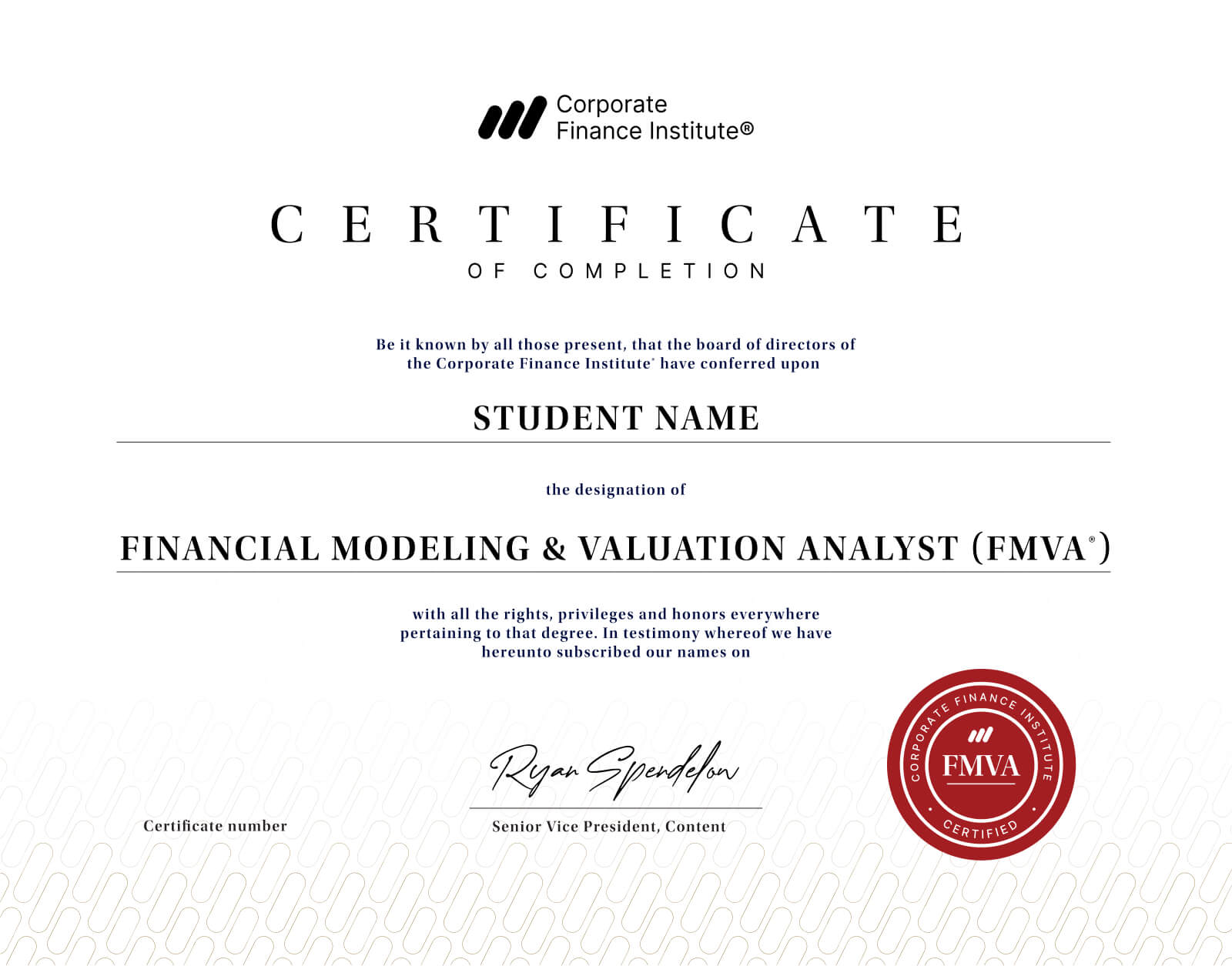Choose from 9 optional courses to learn or review the fundamentals.
-
FMVA® certification program
-
34 total courses (17 required)
-
Self-Paced & 100% Online
-
Get this program and CFI's full training catalog for your organization
-
Manage learning, create custom paths & measure progress
-
For teams of 2 or more learners
FMVA® Program Overview
CFI's Financial Modeling & Valuation Analyst (FMVA®) Certification imparts vital financial analysis skills, emphasizing constructing effective financial models for confident business decisions. This comprehensive program ensures mastery in modeling, budgeting, forecasting, and overall competency in accounting and finance.
The FMVA® certification equips you with essential skills and tools for success as a financial professional. The hands-on curriculum and real-world applications prepare individuals for roles in investment banking, private equity, M&A, business valuation, and corporate finance. The flexible online format, designed for busy professionals, facilitates self-paced learning for skill enhancement and career advancement.
What's in the Financial Modeling & Valuation Analyst Program?
34 courses
Consisting of 2328 lessons
200+ interactive exercises
Learn by doing with guided simulations
Blockchain certificate
To verify your skills
500,000+ 5-star ratings
Best-in-class training, as rated by you
Earning Your Certificate in Financial Analysis
Core Courses
Complete 14 required core courses to build your skill set in financial modeling & valuation analyst.
Elective Courses
Choose a minimum of 3 electives (out of 9 available) to master more advanced topics and specialized areas.
Case Study Challenges
These case study challenges allow you to apply your knowledge and skills by solving real-world problems.
Final Exam
After completing the required courses, take the final exam (with a minimum passing grade of 70%) to earn your program certification.
Get FMVA® Certified
Congratulations on becoming a certified Financial Modeling and Valuation Analyst! Upon completion of the program, you will receive a blockchain digital certificate with your new credentials.
Skills & Learning Objectives in Financial Modeling & Valuation
-
1.25%Finance
-
2.25%Financial Modeling
-
3.16%Excel
-
4.10%Valuation
-
5.8%Presentation & Visuals
-
6.7%Budgeting & Forecasting
-
7.5%Accounting
-
8.4%Strategy
-
Identify key items on the financial statements and describe the interrelationship between all the components
-
Explain the fundamental accounting principles that underly detailed accounting standards
-
Identify the key accounting standards commonly encountered by financial analysts and explain the impact on financial statements and financial models
Meet Your Instructors

Tim Vipond

Scott Powell

Duncan McKeen

Jeff Schmidt
Careers in Financial Modeling & Valuation
Over 85% of executives, supervisors, and HR professionals agree that certified individuals bring value, gain credibility, and are seen as top performers.
* Source
-
Equity Research
Provide investors with financial analysis and recommendations on whether to buy, hold, or sell a particular investment. -
Investment Banking
Provide capital market financing and financial advisory services (e.g. M&A, restructurings). -
Corporate Development
Pursue and execute organic and inorganic growth opportunities for a corporation. -
Financial Planning & Analysis
Develop budgets and forecasts that support a corporation’s strategic planning process. -
Private Equity
Invest in businesses with the goal of increasing their value over time before divesting of the investment.
The FMVA® program has upskilled teams at:
What Our Students Say
Over 75% of CFI learners report improved productivity or competency within weeks.
FMVA certification is challenging, robust and interesting that equips an accounting/finance professional with world-class skills set to advance their careers excel in their endeavors!
Adrian Young
This course was very detailed and structured. I would definitely recommend this Certification for any budding Financial Analyst.
Anirudh Ganeshan
I believe the program fully performs what it promises, bridging the gap between work and higher education. For me it means an added value that I cannot describe in words. The program focuses on technical knowledge, which is highly valued since, on average, a student only learns theory before starting work.
Benjamin Briner
Strongly recommend to everyone who wants to receive new careers opportunities and enhance their knowledge in finance. CFI FMVA is perfect opportunity for everyone to obtain neccessary and strong background in financial modeling and valuation of companies. CFI helped me a lot with providing a financial aid and now my profile as a finance specialist is much more attractive and I receive additional confidence in my valuation skills. Thanks to everybody in the CFI team for creating such brilliant courses.
Alexandr Palienko
Frequently Asked Questions
If you haven’t found your answer from our FAQ, please send us a message.
If you haven’t found your answer from our FAQ, please send us a message.






